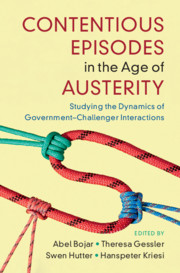 Contentious Episodes in the Age of Austerity
Contentious Episodes in the Age of Austerity Book contents
- Contentious Episodes in the Age of Austerity
- Cambridge Studies in Contentious Politics
- Contentious Episodes in the Age of Austerity
- Copyright page
- Contents
- Figures
- Tables
- Contributors
- Preface
- Part I A New Approach to the Analysis of Contentious Episodes
- 1 Introduction
- 2 Selecting and Coding Contentious Episodes
- 3 The Economic and Political Contexts of the Episodes
- Part II Varieties of Contention
- Part III Dynamics of Interaction
- Part IV Conclusion
- Appendices
- References
- Index
- Series page
3 - The Economic and Political Contexts of the Episodes
from Part I - A New Approach to the Analysis of Contentious Episodes
Published online by Cambridge University Press: 05 November 2021
- Contentious Episodes in the Age of Austerity
- Cambridge Studies in Contentious Politics
- Contentious Episodes in the Age of Austerity
- Copyright page
- Contents
- Figures
- Tables
- Contributors
- Preface
- Part I A New Approach to the Analysis of Contentious Episodes
- 1 Introduction
- 2 Selecting and Coding Contentious Episodes
- 3 The Economic and Political Contexts of the Episodes
- Part II Varieties of Contention
- Part III Dynamics of Interaction
- Part IV Conclusion
- Appendices
- References
- Index
- Series page
Summary
In this chapter, we put the sixty episodes into their economic and political contexts. As suggested in Chapter 1, we assume that the contentiousness of the episodes, the endogenous interaction dynamics that developed in the course of the episodes as well as their outcomes are crucially shaped by the economic and political contexts into which they are embedded. We shall introduce above all two aspects of the political opportunity structure of the challengers in a given episode – the economic problem pressure and the political problem pressure that the government were facing at the outset of the episode. We shall first take a closer look at the development of the economic crisis in the twelve countries and its relation to the severity of the episodes. The depth of the economic crisis has had an impact on the severity of the proposed policy measures. Next, we turn to the political context. In this respect, all of our countries are European democracies, but some of these democracies are of a higher quality than others – in terms of participatory structures and state capacity. The higher the democratic quality, the greater the capacity of the government to deal with economic pressure, and the greater the chance that challengers will get a fair hearing. We shall present some indicators for the quality of the democracy in the various countries under study. Our focus will, however, be on episode-specific aspects of the political context that are likely to have directly shaped the development of the episodes. First among these is the type of government – center-left, center-right, or technocratic – that proposed the policy measures, as well as the timing of the proposals with regard to the government’s tenure. We know from Roberts (2013, 2017) that left-wing governments are much more vulnerable than right-wing governments when they are forced to adopt austerity measures. We shall identify the types of government that were responsible for the various episodes, and analyze their electoral vulnerability. Finally, we shall analyze the timing of the episodes with respect to the political context. We shall show that the timing depends on the combination of political pressure from international actors and strategic considerations of the government.
- Type
- Chapter
- Information
- Contentious Episodes in the Age of AusterityStudying the Dynamics of Government–Challenger Interactions, pp. 44 - 64Publisher: Cambridge University PressPrint publication year: 2021
